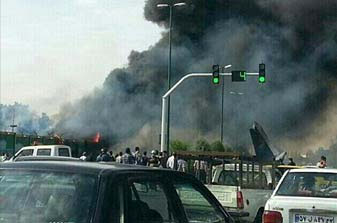 Tehran, Aug 10: A civilian airliner crashed on take-off in a residential area near Tehran's Mehrabad airport today, Iranian news agencies said, with reports that almost 50 people were killed.
Tehran, Aug 10: A civilian airliner crashed on take-off in a residential area near Tehran's Mehrabad airport today, Iranian news agencies said, with reports that almost 50 people were killed.
The plane was headed to the eastern city of Tabas, the IRNA and Fars news agencies said, and crashed at 9.18 am (0448 GMT).
The official IRINN television channel said the plane crashed in the Azadi neighbourhood, west of the airport, but did not state if fatalities were confined to passengers or if people were also killed on the ground.
"All the passengers are dead," a fire service spokesman said on IRNA. A second unnamed official said 48 people were on board the turboprop Antonov An-140 aircraft when it crashed.
There were conflicting accounts of the airline that the plane belonged to, with one report saying it was a Taban Airlines aircraft while another said it was owned by Sepahan Airlines.
Mehrabad is near central Tehran and is Iran's main domestic hub and by far the busiest of the country's airports, serving routes to all Iranian cities.
Most international flights take off from Tehran Imam Khomeini International Airport, which is located further west of the Iranian capital.
The Civil Aviation Authority said the passengers included two infants and three children under the age of 12, the official Islamic Republic News Agency (IRNA) reported.
The plane crashed into the Azad residential block on Mina 6 Boulevard, IRNA reported.
State television reported at least three people in the area were taken to hospital with burns.
A photograph on IRNA's website showed a huge plume of black smoke billowing over traffic standing at a road intersection. A photograph from the Iran Student News Agency showed a charred tailfin lying on the ground.
A spokesman for Tehran's Fire Department was quoted by IRNA as saying the bodies are being transported to the coroner's office.
IRNA reported that an engine shutdown caused the crash. Iran's aviation sector has suffered repeated crashes which have been blamed by Iranian politicians on international sanctions.
Those sanctions have restricted Iranian carriers from buying new aircraft. For years, planes have been kept in service through parts imported on the black market, cannibalised from other planes or reproduced locally, aviation sources say.
The plane that crashed - an Iran-140 - is a locally assembled version of the Antonov-140.
Iran's four largest carriers - Iran Air, Iran Aseman Airlines, Mahan Air and Iran Air Tours - all have average fleet ages above 22 years, Iranian media have reported. They serve a market of 76 million people.
U.S. companies Boeing Co and General Electric Co have said they are seeking to export parts to Iran under the agreement for sanctions relief.
The chief of Iran Air said the airline will need at least 100 passenger jets once sanctions against the country are lifted.
Mehrabad is located in a western suburb of Tehran and mainly functions as a domestic airport, although it also serves some international routes.





Comments
Add new comment